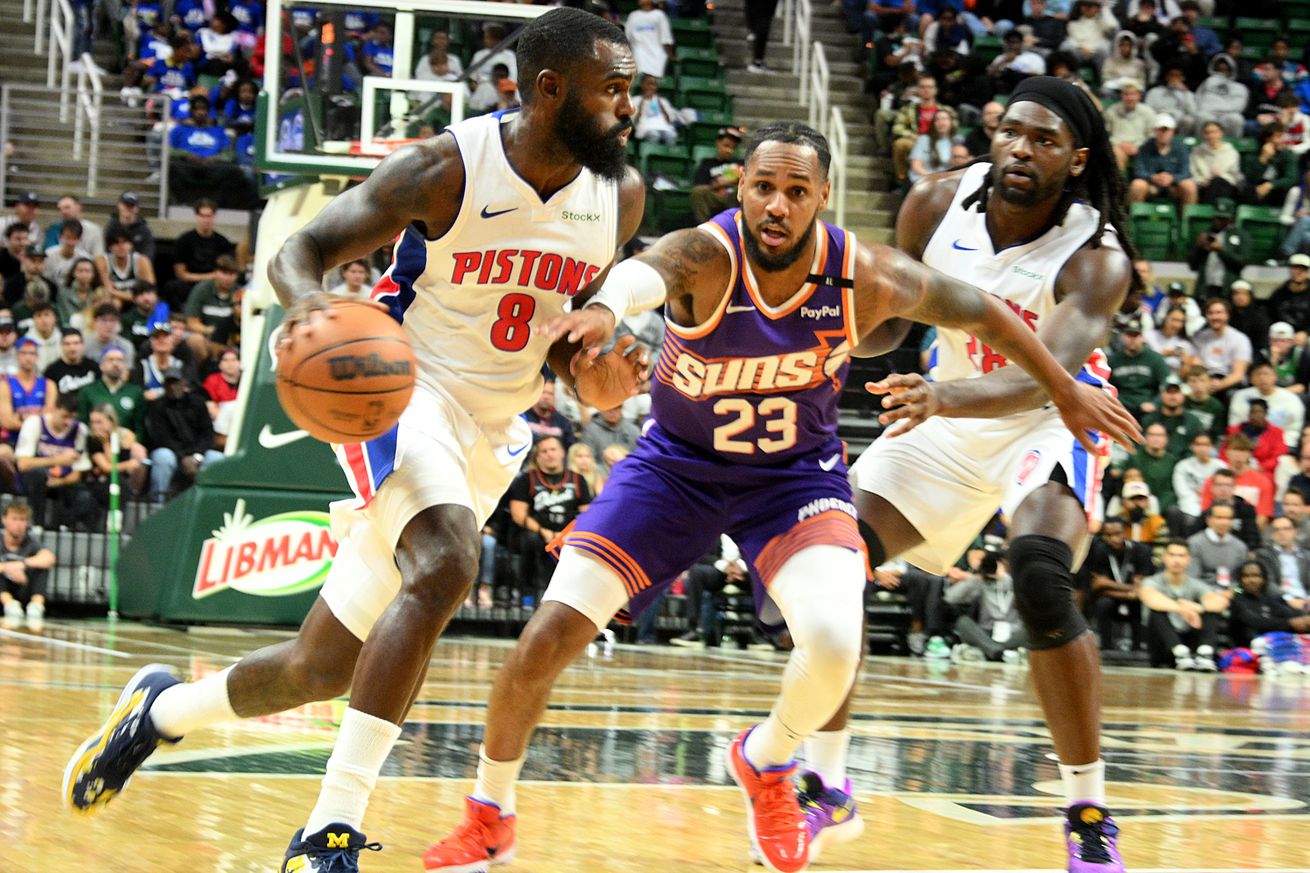
Hardaway is here to make 3s. When he does that he will play, when he doesn’t, he will sit.
When the Detroit Pistons acquired Tim Hardaway Jr. from the Dallas Mavericks this past summer, the trade left many Pistons fans scratching their heads. That sentiment is understandable given that Detroit parted ways with Quentin Grimes, a young wing with a theoretical upside, whose timeline better matched the likes of Cade Cunningham, Jaden Ivey, and Jalen Duren.
And while Grimes has shown flashes of being a contributive rotation player, he’s battled injuries throughout the majority of his young career, and Detroit desperately needs a steady shooting presence throughout the season if they’re to provide the necessary spacing for their young backcourt.
Hardaway has played 70+ games in four of his last five seasons and shot the long ball at a 38% clip on nearly 7.5 attempts per game during that five-season span. He provides shooting, and while he may not bring much more to the table, seeing how the Pistons ranked 26th in team three-point percentage and 29th in three-pointers made last season, his strength directly addresses one of Detroit’s most glaring weaknesses.
Offensive Expectation
It’s still unknown who head coach JB Bickerstaff will deploy as the fifth starter come opening night, considering he’ll have options between Hardaway Jr., Simone Fontecchio and Malik Beasely. But for Hardaway, starter or bench unit, his role will likely be the same. He’ll be tasked with shooting and scoring the basketball, a role similar to that of Alec Burks last season. On a team that made it to the NBA Finals last season, Hardaway was able to carve out nearly 27 minutes per game, while scoring 14.4 points per game on shooting splits of 40/35/85.
Throughout Hardaway’s career, most of his production has come from outside the paint. He doesn’t regularly get to the rim or the free throw line, averaged just 2.1 free throw attempts per game last year, and is coming off a career-low shooting percentage at the rim. But he won’t be asked to be a primary creator – nor should he be. Catch and shoot the basketball, that’s the name of the game. Hardaway ranked 20th of all NBA players last season in catch-and-shoot three-pointers made, and he will be asked to copy-paste those efforts this season.
Hardaway is a much more effective scorer when assisted to, rather than creating on his own – nearly 78% of his field goals made last season resulted from an assist. This isn’t necessarily shocking, seeing how he was often paired with one of the league’s best passers and usage percentage gods in Luka Doncic. Hardaway will find similar opportunities this season, as he’ll often find himself in situations where he’s one of the better shooting options next to Detroit’s floor general in Cunningham or with Ivey, whose passing skills shine brightest in drive and kick situations.
Another avenue where Detroit could utilize Hardaway is as a defacto backup point guard. Detroit’s shooting guard/wing rotation is relatively deep, but their backup point guard slot is undetermined. Bickerstaff could split up Ivey and Cunningham’s minutes, or he could opt for Marcus Sasser to handle those duties. But there’s a world where he utilizes his bench in a non-traditional way, tasking Hardaway with bringing up the ball, and getting Detroit into their sets, not necessarily running the offense as a traditional point guard.
Defensive Expectation
Hardaway isn’t known for his defensive prowess, but he has enough size (6-foot-5 and 205 pounds) and speed to remain on the floor and guard the opposing team’s one through three positions. One of his best attributes may be taking the load off Cunningham and Ivey, who often guard similar positions. Especially in Cunningham’s case, who has historically committed silly fouls earlier in games that have limited his ability to stay on the floor.
Hardaway isn’t expected to play 30+ minutes per game, so if he’s able to save Cunningham a foul here, and a foul there, that could allow Cunningham to get into the flow of the game and not worry about getting pulled early in the first half due to fouls that would be better accrued by the likes of Hardaway. Now you don’t want to rely on Hardaway to regularly guard the Jayson Tatum’s and Paul George’s of the world, but he’s been tasked with similar responsibilities with Mavericks, essentially protecting Doncic from the NBA’s alpha predators.
Overall Expectations
Consider Hardaway Jr. a human relief valve. Detroit’s offense desperately needs space to operate, and he provides that with his shooting. Detroit’s offense desperately needed someone to fill the cup when their go-to guys weren’t having it going, and he provides that with his scoring.
The former Michigan Wolverine will be exactly what you should expect him to be – a shooter and scorer. He’ll take some shots that leave you scratching your head, but he’ll also light up the box score on any given night. He won’t be asked to do anything revolutionary, nor should you want or expect that, and that’s okay.
